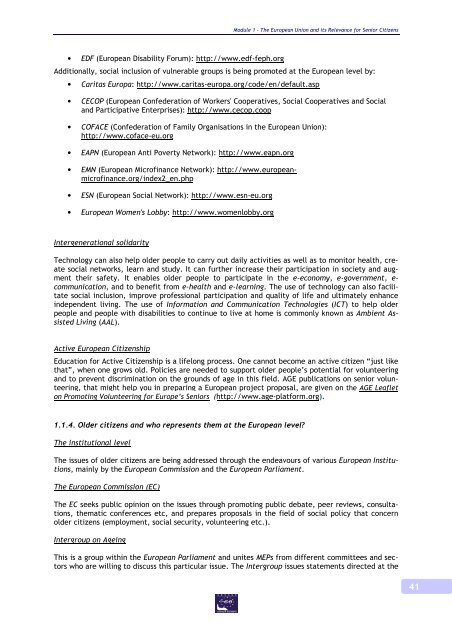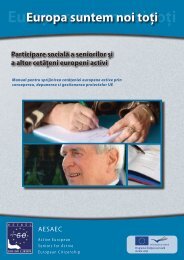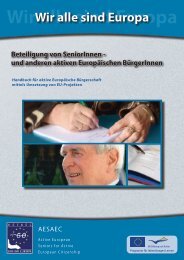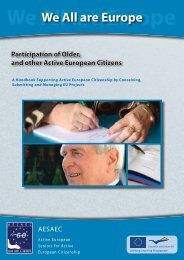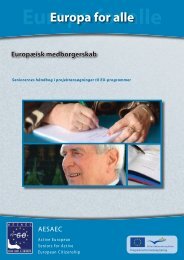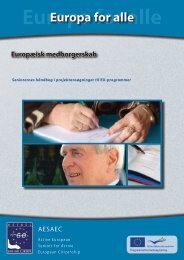We All are Europe - AESAEC
We All are Europe - AESAEC
We All are Europe - AESAEC
Create successful ePaper yourself
Turn your PDF publications into a flip-book with our unique Google optimized e-Paper software.
Module 1 – The <strong>Europe</strong>an Union and its Relevance for Senior Citizens<br />
• EDF (<strong>Europe</strong>an Disability Forum): http://www.edf-feph.org<br />
Additionally, social inclusion of vulnerable groups is being promoted at the <strong>Europe</strong>an level by:<br />
• Caritas Europa: http://www.caritas-europa.org/code/en/default.asp<br />
• CECOP (<strong>Europe</strong>an Confederation of Workers' Cooperatives, Social Cooperatives and Social<br />
and Participative Enterprises): http://www.cecop.coop<br />
• COFACE (Confederation of Family Organisations in the <strong>Europe</strong>an Union):<br />
http://www.coface-eu.org<br />
• EAPN (<strong>Europe</strong>an Anti Poverty Network): http://www.eapn.org<br />
• EMN (<strong>Europe</strong>an Microfinance Network): http://www.europeanmicrofinance.org/index2_en.php<br />
• ESN (<strong>Europe</strong>an Social Network): http://www.esn-eu.org<br />
• <strong>Europe</strong>an Women's Lobby: http://www.womenlobby.org<br />
Intergenerational solidarity<br />
Technology can also help older people to carry out daily activities as well as to monitor health, create<br />
social networks, learn and study. It can further increase their participation in society and augment<br />
their safety. It enables older people to participate in the e-economy, e-government, e-<br />
communication, and to benefit from e-health and e-learning. The use of technology can also facilitate<br />
social inclusion, improve professional participation and quality of life and ultimately enhance<br />
independent living. The use of Information and Communication Technologies (ICT) to help older<br />
people and people with disabilities to continue to live at home is commonly known as Ambient Assisted<br />
Living (AAL).<br />
Active <strong>Europe</strong>an Citizenship<br />
Education for Active Citizenship is a lifelong process. One cannot become an active citizen “just like<br />
that”, when one grows old. Policies <strong>are</strong> needed to support older people’s potential for volunteering<br />
and to prevent discrimination on the grounds of age in this field. AGE publications on senior volunteering,<br />
that might help you in preparing a <strong>Europe</strong>an project proposal, <strong>are</strong> given on the AGE Leaflet<br />
on Promoting Volunteering for <strong>Europe</strong>’s Seniors (http://www.age-platform.org).<br />
1.1.4. Older citizens and who represents them at the <strong>Europe</strong>an level<br />
The institutional level<br />
The issues of older citizens <strong>are</strong> being addressed through the endeavours of various <strong>Europe</strong>an Institutions,<br />
mainly by the <strong>Europe</strong>an Commission and the <strong>Europe</strong>an Parliament.<br />
The <strong>Europe</strong>an Commission (EC)<br />
The EC seeks public opinion on the issues through promoting public debate, peer reviews, consultations,<br />
thematic conferences etc, and prep<strong>are</strong>s proposals in the field of social policy that concern<br />
older citizens (employment, social security, volunteering etc.).<br />
Intergroup on Ageing<br />
This is a group within the <strong>Europe</strong>an Parliament and unites MEPs from different committees and sectors<br />
who <strong>are</strong> willing to discuss this particular issue. The Intergroup issues statements directed at the<br />
41


